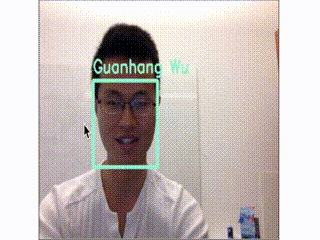See our YouTube video of using this in a real-time web application for face recognition. The source is available in demos/web. The browser portions have been tested on Google Chrome 46 in OSX.
This demo does the full face recognition pipeline on every frame. In practice, object tracking like dlib's should be used once the face recognizer has predicted a face.
In the edge case when a single person is trained, the classifier has no knowledge of other people and labels anybody with the name of the trained person.
The web demo does not predict unknown users and the saved faces are only available for the browser session. If you're interested in predicting unknown people, one idea is to use a probabilistic classifier to predict confidence scores and then call the prediction unknown if the confidence is too low. See the classification demo for an example of using a probabilistic classifier.
To run on your system, first follow the Setup Guide and make sure you can run a simpler demo, like the comparison demo.
If you experience issues with the web demo,
please post to
our mailing list
and include the the WebSocket log contents from
/tmp/openface.websocket.log if available.
Start the HTTP and WebSocket servers on ports 8000 and 9000 in the Docker container with:
docker run -t -p 8000:8000 -p 9000:9000 bamos/openface
Then find the IP address of the container and access the demo
in your browser at http://docker-ip:8000.
Install the requirements for the web demo with
./install-deps.sh and sudo pip install -r requirements.txt
from the demos/web directory.
Start the HTTP and WebSocket servers on ports 8000 and 9000, respectively,
with ./demos/web/start-servers.sh.
If you wish to use other ports,
pass them as ./demos/web/start-servers.sh HTTP_PORT WEBSOCKET_PORT.
You should now also be able to access the demo from your browser
at http://localhost:8000 if running locally or
http://your-server:8000 if running on a server.
